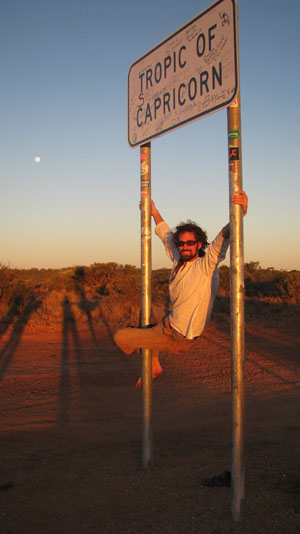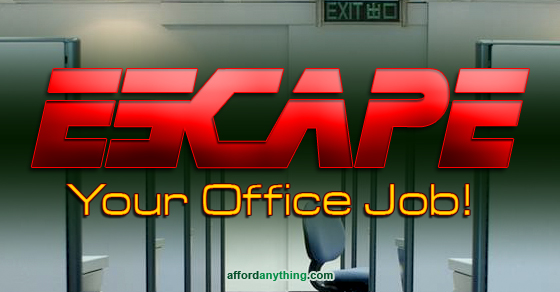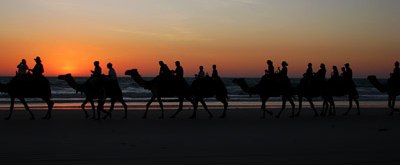Sophia from Minneapolis says:
“The more I sit in an office, the more I want to be location independent. … I feel this need to travel more, to explore, and not be tied to an office in Minnesota.”
 In my last post, I told Sophia how she can see the world for the price of a Honda. Today I’m going to describe how I became location independent — a term that means “I can work from anywhere on Earth with an Internet connection.”
In my last post, I told Sophia how she can see the world for the price of a Honda. Today I’m going to describe how I became location independent — a term that means “I can work from anywhere on Earth with an Internet connection.”
Sophia asks:
Q: When you came back from two years abroad, how did you start earning money again?
I assumed I’d get a “traditional” office job. (Haha! I could NEVER suffer though one of those again!)
Before I launched my two-year round-the-world trip, I hemmed and hawed about how to explain a two-year gap on my resume.
I probably delayed the trip by a year, under the guise of “I’d just like to save a little more,” because I was worried about how to explain this gap.
How silly.
I’d be justified in worrying about a gap if I sat in my pajamas on the couch all day. But I did something kick-a$$.
I prominently display those two gap years on my resume (which I keep updated, even though I’m not looking for jobs). I’m more memorable than 99 percent of the other candidates who have taken the conventional path.
I also note the skills I developed through my two-year trip: like the ability to negotiate in 120-degree heat with someone who doesn’t speak your language.
If I was hiring someone, I’d want a radically self-reliant go-getter on my team. Someone with chutpah. Someone who’s done something awesome.
Q: Were you planning on looking for another journalism job?
I prefer to pave my own path and live on my own terms.
In the year 2011 alone, I took 5 trips to New Orleans, spent one full month in New York, 10 days camping in Nevada, 10 days in the Caribbean, one week on Anna Maria Island in Florida, four days in Los Angeles, three days in St. Louis, two days in Sacramento, dropped by my hometown of Cincinnati and my former home of Denver-Boulder, spent a weekend in Chicago, and went to a festival in Tampa. I couldn’t have done that if I had limited vacation time.
Q: Did you know you wanted to be location independent when you came back?
I had the “anti-dream.” I didn’t dream of being location independent, per se. I recoiled at the alternative to location independence. I shuddered at the thought of needing to “put in a request for vacation time.” Yeech!
Before I traveled, I worked at a newspaper and LOVED it. I wore flip-flops into work and I danced to people’s ringtones. It was that type of place.
But I got two weeks vacation a year, and that drove me crazy.
Don’t interpret this statement to mean “I don’t want to work.” I have no problem working long hours late into the night, as newspapers often demand when there’s a late-breaking story.
But it’s next-to-impossible to run off to Tanzania or Kenya or Russia if you’ve only got 10 business days to do it. THAT’S what bothered me.
I had no idea what I’d do when I returned to the U.S., but I was certain it would be something that would give me freedom to design my life.
No One Gets Paid to Vacation
Bear with me while I take a quick tangent.
Some people are enamored with the concept of “paid vacation.” Paid vacation is a myth.
No one “pays” you to go on vacation. You get paid to work, and your employer pays you in installments throughout the year.
The agreement between you and your boss says: You pay me $X dollars to work 40-50 hours per week, 50 weeks per year. And you’ll pay me in installments.
If I take my “paid vacation” in December, you’re just paying me in delayed installments for work I’ve already done.
Whoever coined the phrase “paid vacation” is a public relations genius.
Okay, thanks for sticking with me through that tangent. Now to answer your question about how I created a location independent job:
A Windy Road to Finding Work You Love
Midway through my overseas adventure, my Dad asked me if I’d be interested in running our family business, a three-person software company. He was nearing 70 and wanted to retire. I’m his only child.
I thought it was a great opportunity to run a small business, so I agreed. Big mistake! I lasted in that company less than six months and hated every minute of it.
If you don’t like your work, you’ll stink at it. The six months I spent at the family business was a waste of everyone’s time: bad for me AND bad for the company.
“Follow your passion” isn’t just a cliché, it’s a practical, down-to-earth recipe for success. We enjoy what we’re good at, and we’re good at what we enjoy. We hate what we suck at, and we suck at what we hate.
I’m good at writing and marketing. So I decided to look for digital (e.g. location independent) opportunities to leverage that talent.
In other words: I designed my life around my desire to be able to pack my bags tomorrow and move to New York / Italy / London. I put lifestyle first, and I eliminated career options that didn’t match that criteria.
Location Independence vs. Passive Income
If I trade my time for money, I’ll always be limited.
Right now I have location independence, but that’s not enough.
My true goal is financial freedom. This can only happen when my money makes money.
My path to financial freedom is through rental properties. I own a handful of homes that stick thousands in my pocketevery month, without forcing me to lift a finger.
Anything I buy must put money in my bank account AFTER I pay a rental company to manage it. If the property can’t create enough income to afford outsourcing everything, then I’m not buying an asset, I’m buying a job. That’s not freedom.
I’m location independent, but I need a few more properties before I’m financially free. I’d better get cracking.




